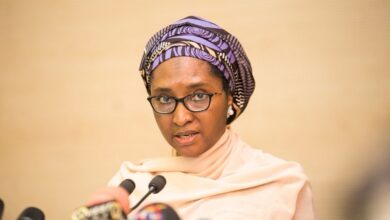Buhari Blames Civil War, Military Rule for Poor Economy

During his Independence Day address on Thursday, President Muhammadu Buhari blamed the Nigerian Civil War, which was fought between July 1967 and January 1970, for disrupting the nation’s growth.
He noted, “Upon attaining independence, Nigeria’s growth trajectory was anchored on policies and programs that positively impacted on all sectors of the economy. However, this journey was cut short by the 30 months of civil war.”
Additionally, he noted that the invasion of the military in politics was responsible for slowing down the developmental trajectory the country attempted to embark upon following the ruins of the disastrous Nigerian Civil War.
Also Read: Nigeria at 60: Buhari Explains Why Nigeria’s “low” Petrol Price is Unsustainable
He said: “We came out of the civil war with a focus on reconstruction, rehabilitation and reconciliation that enabled the country to put in place world class development structures and a strengthened public service that well served the government. This positive trajectory continued with a return to democratic government which was truncated by another round of military rule.”
Buhari noted that, cumulatively, the country has spent a total of 29 years of its 60-year existence as an independent state under military rule.
In 1983, Sheu Shagari was overthrown in a military coup of 1983 and Muhammadu Buhari became head of state.
Power changed hands among military rulers until General Abdulsalami Abubakar took over from the late General Sani Abacha in 1998. Former President Olusegun Obasanjo was thereafter elected in 1999.
These historic disruptions ensured that the country underwent several policy experiments that
affected the nation’s economic trajectory.
The instability of economic policy meant Nigeria was not ruled with a consistent vision towards growth.
The oil boom of the 1970s, which opened up a huge avenue for oil-based wealth, co-coincided with military rule. It is also largely credited with the miscalculated abandonment of agriculture as a major export option for the country.
Also Read: President Buhari Insists Agric Autarky Policies Have Saved Nigeria
By the 1980s, Nigeria’s debt burden was growing at an alarming rate.
According to the World Debt Tables, Nigeria’s total outstanding debt was only $2.5 billion in 1975. It reached $19.55 billion in 1985 and $23.4 billion in 1986. This meant Nigeria had a lot of debt to pay off, with little to show for the debt in developmental projects.
The nation eventually got a debt relief in 2005, led by efforts of former finance minister, Ngozi Okonjo-Iweala.
The debt has since risen in recent years, notably since Mr Buhari came to power in 2015.








One Comment